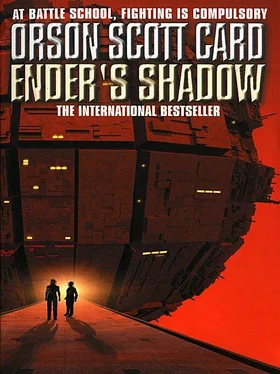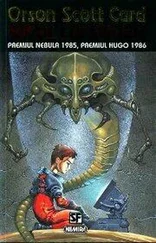Orson Card - Ender's Shadow
Здесь есть возможность читать онлайн «Orson Card - Ender's Shadow» весь текст электронной книги совершенно бесплатно (целиком полную версию без сокращений). В некоторых случаях можно слушать аудио, скачать через торрент в формате fb2 и присутствует краткое содержание. Жанр: Фантастика и фэнтези, на английском языке. Описание произведения, (предисловие) а так же отзывы посетителей доступны на портале библиотеки ЛибКат.
- Название:Ender's Shadow
- Автор:
- Жанр:
- Год:неизвестен
- ISBN:нет данных
- Рейтинг книги:4 / 5. Голосов: 1
-
Избранное:Добавить в избранное
- Отзывы:
-
Ваша оценка:
- 80
- 1
- 2
- 3
- 4
- 5
Ender's Shadow: краткое содержание, описание и аннотация
Предлагаем к чтению аннотацию, описание, краткое содержание или предисловие (зависит от того, что написал сам автор книги «Ender's Shadow»). Если вы не нашли необходимую информацию о книге — напишите в комментариях, мы постараемся отыскать её.
Ender's Shadow — читать онлайн бесплатно полную книгу (весь текст) целиком
Ниже представлен текст книги, разбитый по страницам. Система сохранения места последней прочитанной страницы, позволяет с удобством читать онлайн бесплатно книгу «Ender's Shadow», без необходимости каждый раз заново искать на чём Вы остановились. Поставьте закладку, и сможете в любой момент перейти на страницу, на которой закончили чтение.
Интервал:
Закладка:
"How can I prove it, when you have cut me off from all evidence? Besides, what matters is not whether he has altered genes, but what those genetic changes, if he has them, might lead him to do. Your tests were all designed to allow you to predict the behavior of normal human beings. They may not apply to Bean."
"If he's that unpredictable, then we can't rely on him. He's out."
"What if he's the only one who can win the war? Do you drop him from the program then?"
Bean didn't want to have much food in his body, not tonight, so he gave away almost all his food and turned in a clean tray long before anyone else was done. Let the nutritionist be suspicious -- he had to have time alone in the barracks.
The engineers had always located the intake at the top of the wall over the door into the corridor. Therefore the air must flow into the room from the opposite end, where the extra bunks were unoccupied. Since he had not been able to see a vent just glancing around that end of the room, it had to be located under one of the lower bunks. He couldn't search for it when others would see him, because no one could be allowed to know that he was interested in the vents. Now, alone, he dropped to the floor and in moments was jimmying at the vent cover. It came off readily. He tried putting it back on, listening carefully for the level of noise that operation caused. Too much. The vent screen would have to stay off. He laid it on the floor beside the opening, but out of the way so he wouldn't accidentally bump into it in the darkness. Then, to be sure, he took it completely out from under that bunk and slid it under the one directly across.
Done. He then resumed his normal activities.
Until night. Until the breathing of the others told him that most, if not all, were asleep.
Bean slept naked, as many of the boys did -- his uniform would not give him away. They were told to wear their towels when going to and from the toilet in the night, so Bean assumed that it, too, could be tracked.
So as Bean slid down from his bunk, he pulled his towel from its hook on the bunk frame and wrapped it around himself as he trotted to the door of the barracks.
Nothing unusual. Toilet trips were allowed, if not encouraged, after lights out, and Bean had made it a point to make several such runs during his time in Battle School. No pattern was being violated. And it was a good idea to make his first excursion with an empty bladder.
When he came back, if anyone was awake all they saw was a kid in a towel heading back to his bunk.
But he walked past his bunk and quietly sank down and slid under the last bunk, where the uncovered vent awaited him. His towel remained on the floor under the bunk, so that if anyone woke enough to notice that Bean's bunk was empty, they would see that his towel was missing and assume he had gone to the toilet.
It was no less painful this time, sliding into the vent, but once inside, Bean found that his exercise had paid off. He was able to slide down at an angle, always moving slowly enough to make no noise and to avoid snagging his skin on any protruding metal. He wanted no injuries he'd have to explain.
In the utter darkness of the air duct, he had to keep his mental map of the station constantly in mind. The faint nightlight of each barracks cast only enough light into the air ducts to allow him to make out the location of each vent. But what mattered was not the location of the other barracks on this level. Bean had to get either up or down to a deck where teachers lived and worked. Judging from the amount of time it took Dimak to get to their barracks the rare times that a quarrel demanded his attention, Bean assumed that his quarters were on another deck. And because Dimak always arrived breathing a little heavily, Bean also assumed it was a deck below their own level, not above -- Dimak had to climb a ladder, not slide down a pole, to reach them.
Nevertheless, Bean had no intention of going down first. He had to see whether he could successfully climb to a higher deck before getting himself potentially trapped on a lower one.
So when he finally -- after passing three barracks -- came to a vertical shaft, he did not climb down. Instead, he probed the walls to see how much larger it was than the horizontals. It was much wider -- Bean could not reach all the way across it. But it was only slightly deeper, front to back. That was good. As long as Bean didn't work too hard and sweat too much, friction between his skin and the front and back walls of the duct would allow him to inch his way upward. And in the vertical duct, he could face forward, giving his neck a much-needed respite from being perpetually turned to one side.
Downward was almost harder than upward, because once he started sliding it was harder to stop. He was also aware that the lower he went, the heavier he would become. And he had to keep checking the wall beside him, looking for another side duct.
But he didn't have to find it by probing, after all. He could see the side duct, because there was light in both directions. The teachers didn't have the same lights-out rules as the students, and their quarters were smaller, so that vents came more frequently, spilling more light into the duct.
In the first room, a teacher was awake and working at his desk. The trouble was that Bean, peering out of a vent screen near the floor, could not see a thing he was typing.
It would be that way in all the rooms. The floor vents would not work for him. He had to get into the air-intake system.
Back to the vertical duct. The wind was coming from above, and so that was where he had to go if he was to cross over from one system to another. His only hope was that the duct system would have an access door before he reached the fans, and that he would be able to find it in the dark.
Heading always into the wind, and finding himself noticeably lighter after climbing past seven decks, he finally reached a wider area with a small light strip. The fans were much louder, but he still wasn't near enough to see them. It didn't matter. He would be out of this wind.
The access door was clearly marked. It also might be wired to sound an alarm if it was opened. But he doubted it. That was the kind of thing that was done in Rotterdam to guard against burglars. Burglary wasn't a serious problem on space stations. This door would only have been alarmed if all doors in the station were fitted with alarms. He'd find out soon enough.
He opened the door, slipped out into a faintly lighted space, closed the door behind him.
The structure of the station was visible here, the beams, the sections of metal plating. There were no solid surfaces. The room was also noticeably colder, and not just because he was out of the hot wind. Cold hard space was on the other side of those curved plates. The furnaces might be located here, but the insulation was very good, and they had not bothered to pump much of that hot air into this space, relying instead on seepage to heat it. Bean hadn't been this cold since Rotterdam ... but compared to wearing thin clothing in the winter streets with the wind off the North Sea, this was still almost balmy. It annoyed Bean that he had become so pampered here that he even cared about such a slight chill. And yet he couldn't keep himself from shivering a couple of times. Even in Rotterdam, he hadn't been naked.
Following the ductwork, he climbed up the workmen's ladderways to the furnaces and then found the air-intake ducts and followed them back down. It was easy to find an access door and enter the main vertical duct.
Because the air in the intake system did not have to be under positive pressure, the ducts did not have to be so narrow. Also, this was the part of the system where dirt had to be caught and removed, so it was more important to maintain access; by the time air got past the furnaces, it was already as clean as it was ever going to get. So instead of shinnying up and down narrow shafts, Bean scrambled easily down a ladder, and in the low light still had no trouble reading the signs telling which deck each side opening led to.
Читать дальшеИнтервал:
Закладка:
Похожие книги на «Ender's Shadow»
Представляем Вашему вниманию похожие книги на «Ender's Shadow» списком для выбора. Мы отобрали схожую по названию и смыслу литературу в надежде предоставить читателям больше вариантов отыскать новые, интересные, ещё непрочитанные произведения.
Обсуждение, отзывы о книге «Ender's Shadow» и просто собственные мнения читателей. Оставьте ваши комментарии, напишите, что Вы думаете о произведении, его смысле или главных героях. Укажите что конкретно понравилось, а что нет, и почему Вы так считаете.









